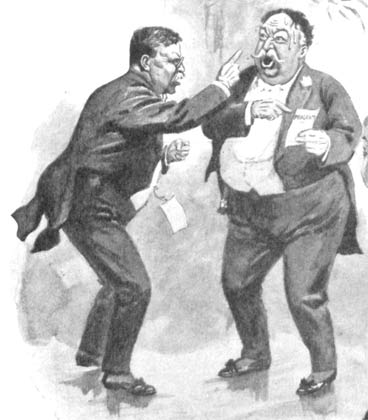
Who remembers the men who lost the presidency?
After the winners are announced, the lawn signs yanked up, and life returns to normal, who cares about the politicians who came in second?
Oh, some ex-candidates may linger in the public memory if they make a good concession speech. And some may hang on as the semi-official critic of the new president. Generally, though, the would-be presidents, whose names were once plastered in giant letters across the country—John W. Davis, Alton B. Parker, and James G. Blaine for example—are quickly forgotten.
However, one candidate—William Howard Taft—deserves to be remembered. Not just for his one-term presidency, but because his unsuccessful run for a second term shaped the course of history for America and the world in the 20th century.
The year was 1912. He was the incumbent. However, former President Theodore Roosevelt also wanted to run as the Republican candidate.
Taft won the nomination— he was the sitting president after all. But Roosevelt, not one to be easily deterred from a goal, formed his own Progressive Party. Between them, they split the Republican vote and underdog Democrat Woodrow Wilson would easily win.
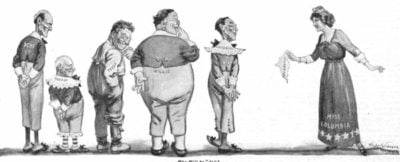
How did things come to such a pass? The field of candidates in the 1912 election was unusually crowded, as shown in this October 1912 Post cartoon (right).
Roosevelt had come to the end of his second term in 1908 with the desire to continue his progressive reforms. So he named Taft, then Secretary of War, as his successor. Roosevelt believed Taft would work just as hard to raise the living standards of American workers, curb the excesses of big business, and set aside land for conservation, public use, and more.
Taft didn’t want the presidency, but Roosevelt could be very persuasive. He was also Taft’s close friend. So Taft agreed to run. He duly won the Republican nomination, and then the 1908 election.
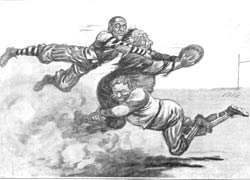
Once elected, though, it was clear that Taft was no Teddy. Where Roosevelt had been passionate and impulsive, ready to push the limits of the law to achieve reforms, Taft was cautious and methodical. Unlike his predecessor, he would compromise with his opponents, and he always worked well within any legal limits on his authority.
Roosevelt soon grew disenchanted with his heir as Taft withdrew support from progressive Republicans in Congress and from several of Roosevelt’s initiatives. The worst offense came in 1910 after Taft put some land marked for conservation back into the hands of private developers. Gifford Pinchot, head of the U.S. Forest Service, publicly criticized Taft’s action. Taft fired Pinchot, who went straight to Roosevelt to complain.
Now Roosevelt was furious. He believed Taft had betrayed him and sold out the Progressive movement. In an interview with the Post (“Why Roosevelt Opposes Taft,” May 4, 1912), Roosevelt explained why he was now opposing his protégé in the race for the Republican nomination.
Mr. Taft was nominated for president … because of his outspoken endorsement of progressive policies. Opposed to these policies … were the Reactionaries. … Without a single exception these men are supporting Mr. Taft today—supporting him openly and with every political trick at their command. They are entirely in accord with his record in the presidency. … Have the Reactionaries become Progressives or has Mr. Taft turned Reactionary? I leave it to the people to judge.
The present Administration has acted for special privilege whenever there was found the slightest authority in law … and has acted for the people in those cases only where it was explicitly commanded by statute. … I gave the people the benefit of the doubt. This Administration has given the benefit of the doubt against the people. [“Why Roosevelt Opposes Taft,” May 4, 1912. Read the full story here.]
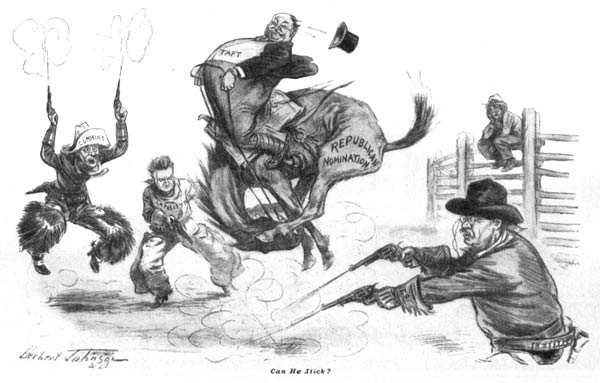
It was a dark time for Taft. The man he once considered his best friend—the man who had talked him into running for president—had denounced him and was planning to kick him out of the White House. To make matters worse, Taft knew he had no talent for campaigning. He hadn’t even a glimmer of Roosevelt’s shining charisma. He was a poor public speaker, and he was ridiculously overweight (in the last two years of his presidency his weight had climbed to 345 pounds).
Yet the Republican party leaders wanted him, even if he had no chance of defeating Roosevelt. In a 1912 assessment of “The Republican Situation,” the Post reported that the Republicans would choose Taft despite all odds because the party would rather “face defeat with him rather than disown and discredit him … and themselves.” Assured of the party’s support, and determined to pursue his own style of progressivism, Taft decided to run.
Roosevelt launched his Progressive Party and campaigned hard—even giving a speech after being shot in the chest—and on Election Day, he received 15 percent more votes than Taft. But he was still 2 million votes short of Wilson.
Taft couldn’t have known that his decision to run would put Wilson into the White House at the beginning of a world war. Or that the new president would wait three years before bringing the U.S. into the war. Or that Wilson would be so focused on building a League of Nations, he allowed the Allies to take vengeance on Germany—an action that would ensure another, bigger war would be fought 20 years later. Nor could he know that, by splitting the progressive vote, he ended its power in the Republican party.
But what if Taft hadn’t stayed in the race? Teddy would have surely won. To read what might have happened if Teddy Roosevelt had been elected to a third (nonconsecutive) term, click here.
Become a Saturday Evening Post member and enjoy unlimited access. Subscribe now
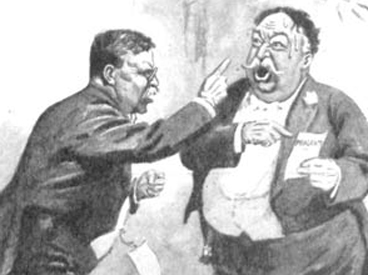


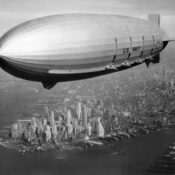
Comments
Teddy Roosevelt, as Bull Moose,
In 1912 for Prez reran,
Got shot by a guy with screws loose,
Screwing up Teddy’s orate plan.
Teddy knew that he had been shot
Through the speech tucked inside his vest,
Not coughing blood, correctly thought
The slug was not deep in his chest.
And so for 90 minutes he,
With his scheduled speech, did proceed,
Even while bleeding profusely.
Hard to stop a Bull Moose – indeed!
That Prez bid, Teddy did not win,
But lived thanks to thick speech and skin.
Chaotic is putting it nicely, Jeff. The cartoon depicting the Wild West was more like it. One can only imagine how angry Teddy Roosevelt was with himself in having Taft as a friend, and vice-versa after all that went down.
As I write these comments, the 2012 election is just a few days off and is giving me cause to think of what unknown outcomes will result from its outcome. Of course, we’ll be lucky to know that by Nov. 6th. Hopefully we won’t have to wait as long as Thanksgiving or possibly even Christmas to know. It’s ashame I can’t say “just kidding” with that last sentence—but I can’t.